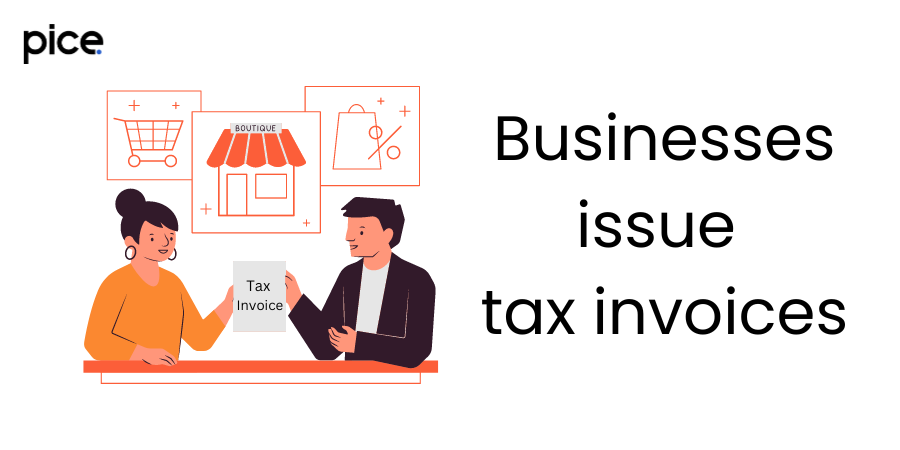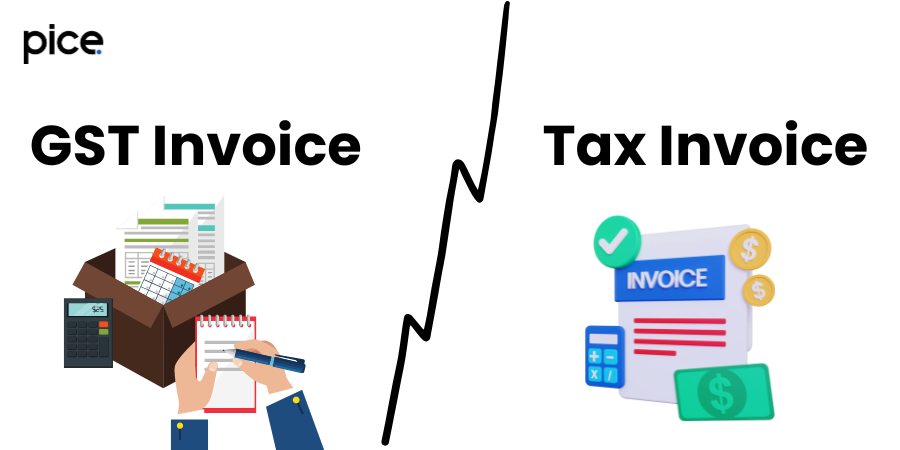Key Takeaways
- A tax invoice is a critical document required for taxable sales, detailing the tax amount payable and ensuring compliance with tax regulations.
- GST invoices are specifically used for transactions involving goods or services subject to GST, including detailed elements like the GSTIN and applicable GST rates.
- Both GST invoices and tax invoices must include comprehensive information such as seller and buyer details, invoice number, and description of goods or services to maintain accurate records.
- The primary objective of GST invoices is to facilitate Input Tax Credit (ITC) claims and ensure proper GST collection, while tax invoices aim to detail the amount of tax payable on sales.
- Understanding the differences between GST invoices and tax invoices helps businesses comply with tax regulations, optimize their tax liabilities, and ensure smooth financial transactions.
What Is a Tax Invoice?
A tax invoice is a crucial document issued by a seller to a buyer, serving as proof of a taxable sale. It is an essential part of the invoicing process, ensuring compliance with tax regulations and providing a transparent record of financial transactions. The primary purpose of it is to detail the amount of tax payable on goods or services sold, thereby facilitating tax collection by the tax authorities.
They are typically used in business practices involving the supply of services or goods. They must be issued for all taxable sales and are required for claiming Input Tax Credit (ITC). The document serves multiple purposes, including acting as a legal document and a proof of purchase, which is crucial for maintaining accurate records and ensuring compliance with tax purposes.
In different business scenarios, various types of invoices are issued, such as retail invoices for consumer sales and commercial invoices for business-to-business transactions. Each type of invoice must meet specific legal requirements and include particular information to be considered valid. The relevant authority overseeing tax collection mandates these requirements to ensure uniformity and transparency in financial activities.
When is a Tax Invoice Required?
A tax invoice is required whenever there is a taxable sale of goods or services. This document must be issued at the time of the supply or within a specified time limit, usually determined by the tax regulations governing the business owner. For instance, in domestic transactions, the invoice should be issued before or at the time of delivery, ensuring compliance with tax regulations.
The issuance of the invoices is mandatory for all taxable sales to ensure that applicable taxes are correctly recorded and paid. This requirement helps in maintaining detailed records of financial transactions, thereby minimizing the risk of errors and ensuring smooth transactions. By issuing valid invoices, businesses can avoid legal issues and penalties associated with non-compliance.
Who Issues Tax Invoices?

Tax invoices are issued by the seller or the service provider involved in the taxable sale. This includes business owners and entities involved in the supply of goods or services subject to applicable taxes. The process of issuing invoices must comply with specific guidelines set by the tax authorities to ensure the correct tax rate is applied and recorded.
In various business practices, the responsibility of issuing the document falls on the seller at the point of sale or the service provider at the time of service delivery. The document must include all necessary details, such as the type of invoice, applicable tax rates, and the total tax amount payable. Compliance with these requirements ensures that businesses maintain accurate records and adhere to legal obligations.
What Information is Included in a Tax Invoice?
A tax invoice must include specific information to be considered valid. Key elements of a tax invoice typically include:
- The seller’s and buyer’s details, including names and addresses
- A unique invoice number for tracking purposes
- The date of issue
- A detailed description of the goods or services provided
- The quantity and unit price of each item
- The applicable tax rate and the total tax amount payable
- Payment terms, including any applicable discounts
- The signature of the authorized person issuing the invoice
This comprehensive information ensures accurate tax calculation and helps in maintaining transparent records for tax purposes. It also serves as proof of purchase and is crucial for claiming Input Tax Credit (ITC).
Advantages of a Tax Invoice
Tax invoices offer several advantages for both businesses and tax authorities:
- Compliance with Tax Regulations: Issuing valid tax invoices ensures businesses comply with legal requirements, avoiding penalties and legal issues.
- Accurate Records: Detailed tax invoices help maintain accurate financial records, facilitating smooth audits and financial planning.
- Input Tax Credit: Businesses can claim ITC on purchases made, reducing their overall tax liability.
- Transparent Transactions: Tax invoices provide a clear and transparent record of all transactions, fostering trust with customers and stakeholders.
- Facilitates Business Operations: By standardizing the invoicing process, tax invoices help streamline business operations and ensure consistent taxation.
Disadvantages of a Tax Invoice
Despite their benefits, tax invoices also have some disadvantages:
- Administrative Burden: The process of issuing and managing tax invoices can be time-consuming and requires meticulous record-keeping.
- Complexity: Understanding and complying with various legal requirements for different types of invoices can be challenging for small businesses.
- Risk of Errors: Mistakes in tax invoices, such as incorrect tax rates or missing information, can lead to compliance issues and penalties.
- Costs: Implementing systems for issuing and tracking tax invoices can incur additional costs for businesses.
- Legal Consequences: Failure to issue proper tax invoices can result in severe legal consequences, impacting business operations.
What Is a GST Invoice?
A GST invoice is a document issued by a seller to a buyer, detailing the goods or services provided and the applicable GST rates. This invoice is crucial for the GST return filing process and helps in maintaining compliance with GST regulations. The GST invoice must include specific information to be considered valid, such as the seller’s and buyer’s details, a unique invoice number, the date of issue, a description of the goods or services, the quantity, the unit price, and the total amount payable, including GST.
💡 If you want to pay your GST with Credit Card, then download Pice Business Payment App. Pice is the one stop app for all paying all your business expenses.
The purpose of a GST invoice is to ensure that the correct amount of GST is collected and recorded. This is essential for both the seller and the buyer, as the GST invoice allows the buyer to claim Input Tax Credit (ITC) on their purchases. The document serves as proof of the transaction and helps maintain accurate records for tax purposes.
GST Invoice Requirements
The requirements for a GST invoice are outlined by the relevant tax authorities and must be strictly followed to ensure compliance. Key requirements include:
- A unique invoice number for each GST invoice
- The date of issue
- The names, addresses, and GSTIN (GST Identification Number) of both the seller and the buyer
- A detailed description of the goods or services supplied
- The quantity and unit price of each item
- The applicable GST rate and the total GST amount payable
- Payment terms and conditions
- Any applicable discounts
These requirements ensure that the GST invoice provides all necessary information for tax calculation and compliance, facilitating smooth financial transactions and accurate record-keeping.
Advantages of a GST Invoice
GST invoices offer several advantages, including:
- Facilitates ITC Claims: Buyers can claim Input Tax Credit (ITC) on purchases made using GST invoices, reducing their overall tax liability.
- Compliance with GST Regulations: Issuing GST invoices ensures businesses comply with GST laws, avoiding penalties and legal issues.
- Accurate Tax Calculation: Detailed GST invoices help ensure that the correct GST amount is collected and recorded.
- Streamlined Invoicing Process: Standardized GST invoices simplify the invoicing process, making it easier for businesses to manage their financial transactions.
- Transparent Records: GST invoices provide a clear and transparent record of all transactions, fostering trust with customers and stakeholders.
Disadvantages of a GST Invoice
However, there are also some disadvantages to GST invoices:
- Administrative Complexity: The requirements for issuing GST invoices can be complex and time-consuming, particularly for small businesses.
- Cost of Compliance: Implementing systems to issue and track GST invoices can incur additional costs for businesses.
- Risk of Errors: Mistakes in GST invoices, such as incorrect GST rates or missing information, can lead to compliance issues and penalties.
- Increased Documentation: The need to maintain detailed records of all GST invoices can be burdensome for businesses.
- Legal Consequences: Failure to issue proper GST invoices can result in severe legal consequences, impacting business operations.
What Are the Key Differences?

Definition
The key difference between a GST invoice and a tax invoice lies in their definitions. A GST invoice is specifically used for transactions involving goods or services subject to GST, detailing the applicable GST rates and enabling Input Tax Credit (ITC) claims. In contrast, a tax invoice is a broader term that can refer to any invoice issued for taxable sales, detailing the tax amount payable and ensuring compliance with tax regulations.
Contents
While both GST and tax invoices require detailed information, a GST invoice must include specific elements such as the GSTIN of the seller and buyer, the applicable GST rate, and the total GST amount payable. Tax invoices, on the other hand, may not require GST-specific details but must include other key elements such as the seller’s and buyer’s details, a unique invoice number, and a description of the goods or services provided.
Objective
The primary objective of a GST invoice is to ensure the correct collection and recording of GST, facilitating ITC claims and compliance with GST regulations. A tax invoice aims to detail the amount of tax payable on a sale, ensuring compliance with broader tax regulations and providing proof of the transaction.
Preparation
The preparation of GST invoices involves including GST-specific details and following guidelines set by the GST authorities. Tax invoices, while also requiring detailed information, may have different preparation requirements depending on the type of invoice and the applicable tax regulations.
Authorization
Both GST and tax invoices must be authorized by the seller or service provider issuing the invoice. This involves ensuring that the invoice meets all legal requirements and includes all necessary information to be considered valid. The authorization process helps in maintaining accurate records and ensuring compliance with tax regulations.
In conclusion, understanding the differences between GST tax invoices and tax invoices is crucial for businesses to ensure compliance with tax regulations, maintain accurate records, and facilitate smooth financial transactions. By issuing valid invoices, businesses can avoid legal issues, optimize their tax liabilities, and foster trust with customers and stakeholders.
FAQs
Is SAC code and HSN code the same?
No, SAC code and HSN code are not the same. SAC (Service Accounting Codes) are used to classify services, whereas HSN (Harmonized System of Nomenclature) codes are used to classify goods. Both codes help in determining the taxes applicable for their respective categories and ensure consistent tax compliance.
Is HSN code 6-digit or 8-digit?
HSN codes can be either 6-digit or 8-digit. The 6-digit code provides a general classification of goods, while the 8-digit code offers a more detailed classification. This detailed classification ensures accurate application of taxes, including value-added tax and GST.
How do I find my GST HSN and SAC code?
You can find your GST HSN and SAC codes by consulting the GST rate schedule or using the official GST portal. These codes are essential for issuing invoices and ensuring that the taxes applicable to your goods or services are correctly calculated and documented in your financial records.
Is SAC code 4 digit or 6-digit?
SAC codes can be both 4-digit and 6-digit. The 4-digit code provides a broad classification of services, while the 6-digit code offers a more specific categorization. Using the appropriate SAC code ensures accurate tax calculation and compliance with GST regulations.
What is the HSN code in GST?
The HSN code in GST is a standardized system for classifying goods, facilitating the correct application of GST rates. It consists of either a 6-digit or 8-digit code, ensuring that value-added tax and other applicable taxes are consistently applied across different products.
Can we use a 4 digit HSN code?
Yes, a 4-digit HSN code can be used for a general classification of goods. However, for more precise identification and to meet regulatory requirements, especially for international trade, a 6-digit or 8-digit code may be necessary to ensure accurate tax application and compliance.
Is HSN code mandatory in GST limit?
Yes, using the HSN code is mandatory for businesses exceeding a specified GST turnover limit. This requirement helps in maintaining consistent and accurate tax application, making it easier to issue invoices and manage financial documents related to tax compliance.








